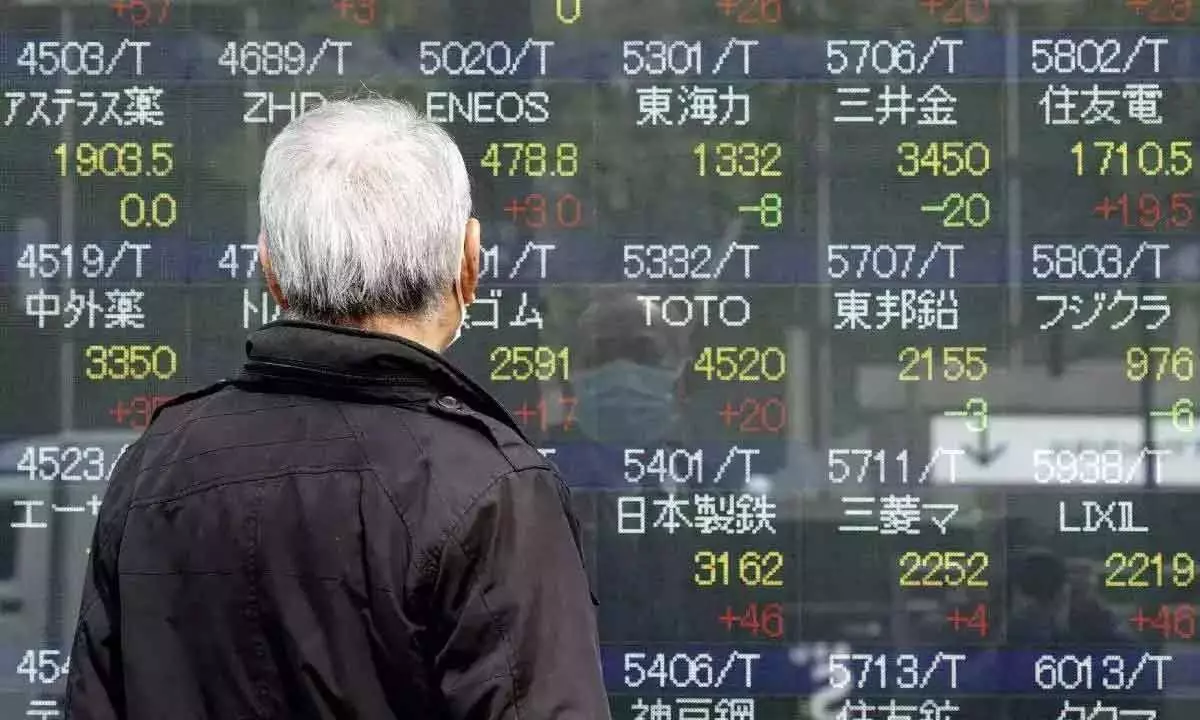Asian stocks recalibrating on mixed results in US mkts
Seoul, Tokyo and Shanghai settled in the positive territory, while Hong Kong ended lower; European markets were trading mostly in the green
image for illustrative purpose

The Fed had jacked up rates in hopes of slowing the economy and hurting investment prices enough to put downward pressure on inflation and get it back to its 2% goal. Last week, investors took comments from Fed Chair Jerome Powell to indicate the central bank’s hikes to interest rates may be done. A recent sharp drop in oil prices has relieved some inflationary pressure, raising the likelihood the Fed might hold rates steady instead of raising them further
Bangkok: Shares were mostly higher in Asia on Thursday after another mixed close on Wall Street where benchmarks have been recalibrating following recent big swings. Stock prices fell in Hong Kong, Bangkok and Mumbai and rose in Tokyo, Seoul and Shanghai. US futures slipped and oil prices edged higher. China reported that its consumer prices fell 0.2 per cent from a year earlier in October while factory-gate prices declined 2.6 per cent, suggesting demand remains slack as the economy struggles to recover from the economic disruptions of the pandemic.
Falling prices have raised worries that China may fall into a bout of deflation, or chronically lower prices, but some analysts say much of the weakness recently is due to a decline in the cost of pork, a staple item for Chinese. “What China has right now, is a low rate of underlying inflation, which reflects the fact that domestic demand is fairly weak,” Robert Carnell of ING Economics said in a report. “If you want to use any term, disinflation’ would be my preference, but what we are seeing today is mainly the result of a supply excess, rather than a collapse in demand,” he said.
Hong Kong’s Hang Seng lost 0.2 per cent to 17,533.23 and the Shanghai Composite index edged less than 1 point higher, to 3,053.28. In Tokyo, the Nikkei 225 index jumped 1.5 per cent to 32,646.46 after Prime Minister Fumio Kishida told local reporters he had decided against calling an election before the end of the year. South Korea’s Kospi added 0.2 per cent to 2,427.08, while in Australia, the S&P/ASX 200 gained 0.3 per cent to 7,014.90. In Bangkok, the SET lost 1.3 per cent. On Wednesday, the S&P 500 edged up 0.1 per cent, to 4,382.78. Though the gain was slight, it was enough to extend the index’s winning streak to eight days. That ties its longest such winning streak since a nine-day run 19 years ago. The Dow Jones Industrial Average slipped 0.1 per cent to 34,112.27, and the Nasdaq composite rose 0.1 per cent to 13,650.41. Eli Lilly rose 3.2 per cent after US regulators said its popular diabetes treatment, Mounjaro, can be sold as a weight-loss drug and tap into a market with massive potential. American Airlines, Delta Air Lines and United Airlines were also toward the front of the market, each gaining more than 2 per cent as oil prices continued to drop and ease the pressure on fuel costs.
Warner Brothers Discovery tumbled 19 per cent after reporting a worse loss for the latest quarter than analysts expected. It also lost more streaming subscribers than forecast. The 10-year Treasury yield was at 4.49 per cent, down from 4.57 per cent late Tuesday, helping to impart calm across financial markets. A swift rise in the 10-year yield beginning in the summer dragged the S&P 500 down by more than 10 per cent from its peak for the year. The 10-year yield briefly topped 5 per cent to reach its highest level since 2007, as it tracked the Federal Reserve’s main interest rate, which is above 5.25 per cent and at its highest level since 2001.
The Fed has jacked up rates in hopes of slowing the economy and hurting investment prices enough to put downward pressure on inflation and get it back to its 2 per cent goal. Last week, investors took comments from Fed Chair Jerome Powell to indicate the central bank’s hikes to interest rates may be done. A recent sharp drop in oil prices has relieved some inflationary pressure, raising the likelihood the Fed might hold rates steady instead of raising them further.

